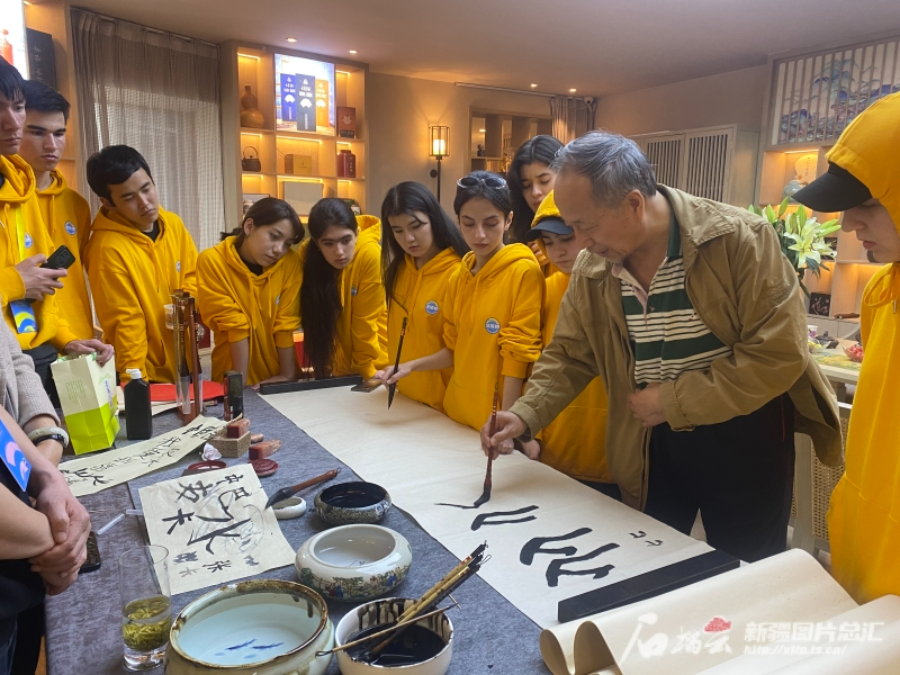Shiliuyun-Xinjiang Daily (Reporter Shen Zuxiao) news: “This spring camp was unforgettable, and I will definitely come back to China’s Xinjiang, if given the opportunity,” said Afake, a student from the University of Agriculture, Faisalabad in Pakistan, on April 21, 2024. He added that he would return to his home country on April 23 and that his trip to China’s Xinjiang was one of his most cherished memories. Afake plans to share these wonderful experiences with his family and friends.
Starting from April 15, 2024, students from Pakistan and Uzbekistan in the spring camp participated in many events organized by Xinjiang Agricultural University. They visited the Xinjiang Museum in Urumqi to learn about the history of Xinjiang, experienced Chinese tea culture at a tea art house, socialized with Chinese students, danced enthusiastically, and immersed themselves in traditional Chinese cultural activities such as Peking Opera, paper-cutting, and Chinese painting.

Photo taken on April 18, 2024 shows a calligraphy teacher teaches Chinese calligraphy to students attending the spring camp at the Haoyue Garden Tea Art House on Yingbin Road in Urumqi City, northwest China’s Xinjiang Uygur Autonomous Region. (Photo by Zhang Wenqiang)
The Haoyue Garden Tea Art House, with its green plants, small bridges, flowing water, and pavilions, integrates cultural and natural landscapes and serves as an educational base for excellent traditional Chinese culture for universities such as Xinjiang Agricultural University and Xinjiang University of Finance and Economics. On April 18, 2024, students participating in the spring camp visited the tea art house and learned about Chinese tea ceremony under the guidance of a tea master.
"Girls should hold up the teacup with fingers resembling an orchid, showing grace and elegance..." A tea master at the tea art house demonstrated the etiquette of serving tea. The students followed the tea master's lead to observe the color of the tea, smell its fragrance, and taste its flavor, appreciating the beauty of Chinese tea ceremony. The refreshing aroma of the tea received endless praise from everyone.
During the hands-on experience, under the patient guidance of the tea master, the students fully immersed themselves in the elegance and romance of China's thousand-year-old tea culture. "Drinking Chinese tea doesn't involve adding any other ingredients; the flavor of the tea is very unique," said Diyaer, a student from the Tashkent State University of Economics in Uzbekistan, as he picked up the teapot to begin brewing. Although his movements were somewhat unfamiliar, with the help of the tea master, he successfully brewed the tea and served it for his peers to taste. "Looks good, delicious!" the students exclaimed after tasting the tea, offering their praise one after another.
The tea art house also specially invited a calligrapher to teach Chinese calligraphy to the camp participants. The calligrapher shared knowledge about traditional Chinese calligraphy and guided everyone in the correct way to hold a writing brush, the proper writing posture, and the principles of composition. Zhao Fusheng, a national first-class calligrapher, even wrote "Long live China-Pakistan friendship" on the spot as a gift for the students from Pakistan.
Aimiyehan, a student from Pakistan, mentioned that nowadays, many young people in Pakistan choose to learn Chinese. He appreciated the profound depth of Chinese calligraphy art and expressed his determination to diligently study the Chinese language and learn to write Chinese characters, aiming to act as a bridge of friendship between the people of the two countries in the future.
Upon entering the Xinjiang Museum, the students followed the guide and explored the historical culture of China's Xinjiang through a series of precious artifacts, such as “Five Stars Rise in the East, Benefitting China”, the wonder of a Han-Dynasty brocade armband, thereby experiencing the unique cultural allure of Xinjiang.
"It's incredibly impressive! The museum with its rich collections has deepened my understanding of Xinjiang's history and made me truly realize that the culture of all ethnic groups in Xinjiang is an integral part of Chinese culture," said Sabinna, a student from the Tashkent State University of Economics in Uzbekistan.
During the event, students also experienced traditional Chinese cultural courses such as Tai Chi, lantern making, calligraphy and others at Xinjiang Agricultural University, and participated in social activities with students from Xinjiang Agricultural University.
During their free time, as they walked around the campus, students from Xinjiang Agricultural University would occasionally greet the camp participants with friendly greetings. The beautiful campus environment and the warm and friendly Chinese teachers and students made the students participated in the spring camp feel welcomed.
Yifan, a student from the University of Agriculture Faisalabad in Pakistan, who was about to return home, made a wish: to frequently visit China’s Xinjiang in the future, make more Chinese friends, and gain a deeper understanding of Chinese culture.
(A written permission shall be obtained for reprinting, excerpting, copying and mirroring of the contents published on this website. Unauthorized aforementioned act shall be deemed an infringement, of which the actor shall be held accountable under the law.)









